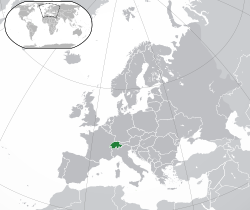Swiss Confederation
|
Swiss Confederation |
|||||
|---|---|---|---|---|---|
|
|||||

Location of Switzerland (green)
in Europe (green & dark grey) |
|||||
| Capital | None (de jure) Bern (de facto) 46°57′N 7°27′E / 46.950°N 7.450°E |
||||
| Largest city | Zürich | ||||
| Official languages |
German French Italian Romansh |
||||
| Demonym | English: Swiss, German: Schweizer(in), French: Suisse(sse), Italian: svizzero/svizzera, or elvetico/elvetica, Romansh: Svizzer/Svizra |
||||
| Government | Federal semi-direct democracy under multi-party parliamentary directorial republic | ||||
| Walter Thurnherr | |||||
| Legislature | Federal Assembly | ||||
| Council of States | |||||
| National Council | |||||
| History | |||||
| c. 1300 (traditionally 1 August 1291) | |||||
| 24 October 1648 | |||||
| 7 August 1815 | |||||
| 12 September 1848 | |||||
| Area | |||||
|
• Total
|
41,285 km2 (15,940 sq mi) (135th) | ||||
|
• Water (%)
|
4.2 | ||||
| Population | |||||
|
• 2016 estimate
|
8,401,120 (99th) | ||||
|
• 2015 census
|
8,327,126 | ||||
|
• Density
|
202/km2 (523.2/sq mi) (63rd) | ||||
| GDP (PPP) | 2016 estimate | ||||
|
• Total
|
$493.126 billion (39th) | ||||
|
• Per capita
|
$59,150 (9th) | ||||
| GDP (nominal) | 2016 estimate | ||||
|
• Total
|
$651.770 billion (19th) | ||||
|
• Per capita
|
$78,179 (2nd) | ||||
| Gini (2015) |
low · 19th |
||||
| HDI (2014) |
very high · 3rd |
||||
| Currency | Swiss franc (CHF) | ||||
| Time zone | CET (UTC+1) | ||||
|
• Summer (DST)
|
CEST (UTC+2) | ||||
| Date format | dd.mm.yyyy (AD) | ||||
| Drives on the | right | ||||
| Calling code | +41 | ||||
| Patron saint | St Nicholas of Flüe | ||||
| ISO 3166 code | CH | ||||
| Internet TLD | .ch | ||||
|
Website
www |
|||||
in Europe (green & dark grey)
Switzerland (/ˈswɪtsərlənd/), officially the Swiss Confederation, is a federal republic in Europe. It consists of 26 cantons, and the city of Bern is the seat of the federal authorities. The country is situated in Western-Central Europe, and is bordered by Italy to the south, France to the west, Germany to the north, and Austria and Liechtenstein to the east. Switzerland is a landlocked country geographically divided between the Alps, the Swiss Plateau and the Jura, spanning an area of 41,285 km2 (15,940 sq mi). While the Alps occupy the greater part of the territory, the Swiss population of approximately eight million people is concentrated mostly on the plateau, where the largest cities are to be found: among them are the two global cities and economic centres Zürich and Geneva.
The establishment of the Old Swiss Confederacy dates to the late medieval period, resulting from a series of military successes against Austria and Burgundy. Swiss independence from the Holy Roman Empire was formally recognized in the Peace of Westphalia in 1648. The country has a history of armed neutrality going back to the Reformation; it has not been in a state of war internationally since 1815 and did not join the United Nations until 2002. Nevertheless, it pursues an active foreign policy and is frequently involved in peace-building processes around the world. In addition to being the birthplace of the Red Cross, Switzerland is home to numerous international organisations, including the second largest UN office. On the European level, it is a founding member of the European Free Trade Association, but notably not part of the European Union or the European Economic Area. However, it participates in the Schengen Area and the European Single Market through bilateral treaties.
...
Wikipedia


